- Home
- Diana Wynne Jones
Witch Week
Witch Week Read online
DIANA WYNNE JONES
THE CHRONICLES OF CHRESTOMANCI
WITCH WEEK
Contents
Cover
Title Page
Note: There are thousands of worlds, all different from ours.
Editor’s Note: Late one night in 1605, a soldier named Guy Fawkes. . .
1 THE NOTE SAID: SOMEONE IN THIS CLASS IS A WITCH.
2 THE NEXT DAY was the day Miss Hodge tried to find out who had written the note.
3 THAT AFTERNOON, Nan came into the classroom to find a broom laid across her desk.
4 AT THE END OF LESSONS, there was the usual stampede to be elsewhere.
5 CHARLES HAD THOUGHT, in the locker room, that he had been as frightened
6 CHARLES GOT UP. He remembered to put on his glasses.
7 BREAKFAST WAS READY before 6B had been called to find their shoes.
8 SIMON ARRIVED LATE for lessons. He had been making sure his heap of gold was safe.
9 THE OLD LAB was not used for anything much except detention.
10 THE NEXT MORNING, Brian Wentworth did not get up. Simon threw a pillow at him as he lay there,
11 CHARLES JOGGED around the playing field towards the groundsman’s hut.
12 A DOG BARKED EXCITEDLY up the hill. Everyone except the stranger jumped.
13 THE SCHOOL SECRETARY dissolved into dither. She gushed. It was just as well.
14 MR. WENTWORTH OPENED the door and ushered the four of them into the classroom,
15 THE REST OF 6B shuffled slowly in and out of the study. Some came out white,
16 “I’M VERY SORRY, SIR,” said one of the boys. He sounded as if he meant it, for a wonder.
PerfectBound E-book Exclusive Extras:
Who Is Chrestomanci?
About Dressing Gowns
Related Worlds
Types of Magic
Chrestomanci Castle
The Importance of Cats
The Willing Warlock
Oneir
Tonino
The Worlds of Diana Wynne Jones: An Interview
About the Author
Books by Diana Wynne Jones
Credits
Copyright
About the Publisher
Note
THERE ARE THOUSANDS of worlds, all different from ours. Chrestomanci’s world is the one next door to us, and the difference here is that magic is as common as music is with us. It is full of people working magic—warlocks, witches, thaumaturges, sorcerers, fakirs, conjurors, hexers, magicians, mages, shamans, diviners and many more—from the lowest Certified witch right up to the most powerful of enchanters. Enchanters are strange as well as powerful. Their magic is different and stronger and many of them have more than one life.
Now, if someone did not control all these busy magic-users, ordinary people would have a horrible time and probably end up as slaves. So the government appoints the very strongest enchanter there is to make sure no one misuses magic. This enchanter has nine lives and is known as “the Chrestomanci.” You pronounce it KREST-OH-MAN-SEE. He has to have a strong personality as well as strong magic.
DIANA WYNNE JONES
EDITOR’S NOTE
Late one night in 1605, a soldier named Guy Fawkes was caught with some two tons of gunpowder that he had smuggled into a cellar beneath the Houses of Parliament in London. Fawkes was arrested, tried, and executed for his part in the Gunpowder Plot—a failed conspiracy to blow up King James I and most of his government the very next day, November 5. Centuries later, English people still set off fireworks, light bonfires, and burn “Guys” in effigy to celebrate November 5 as Guy Fawkes Day.
1
THE NOTE SAID: SOMEONE IN THIS CLASS IS A WITCH. It was written in capital letters in ordinary blue ballpoint, and it had appeared between two of the geography books Mr. Crossley was marking. Anyone could have written it. Mr. Crossley rubbed his ginger moustache unhappily. He looked out over the bowed heads of Class 6B and wondered what to do about it.
He decided not to take the note to the headmistress. It was possibly just a joke, and Miss Cadwallader had no sense of humor to speak of. The person to take it to was the deputy head, Mr. Wentworth. But the difficulty there was that Mr. Wentworth’s son was a member of 6B—the small boy near the back who looked younger than the rest was Brian Wentworth. No. Mr. Crossley decided to ask the writer of the note to own up. He would explain just what a serious accusation it was and leave the rest to the person’s conscience.
Mr. Crossley cleared his throat to speak. Some of 6B looked up hopefully but Mr. Crossley had changed his mind then. It was journal time, and journal time was only to be interrupted for a serious emergency. Larwood House was very strict about that rule. Larwood House was very strict about a lot of things, because it was a boarding school run by the government for witch-orphans and children with other problems. The journals were to help the children with their problems. They were supposed to be strictly private. Every day, for half an hour, every pupil had to confide his or her private thoughts to their journals, and nothing else was done until everyone had. Mr. Crossley admired the idea heartily.
But the real reason that Mr. Crossley changed his mind was the awful thought that the note might be true. Someone in 6B could easily be a witch. Only Miss Cadwallader knew who exactly in 6B was a witch-orphan, but Mr. Crossley suspected that a lot of them were. Other classes had given Mr. Crossley feelings of pride and pleasure in being a schoolmaster; 6B never did. Only two of them gave him any pride at all: Theresa Mullett and Simon Silverson. They were both model pupils. The rest of the girls tailed dismally off until you came to empty chatterers like Estelle Green, or that dumpy girl, Nan Pilgrim, who was definitely the odd one out. The boys were divided into groups. Some had the sense to follow Simon Silverson’s example, but quite as many clustered around that bad boy Dan Smith, and others again admired that tall Indian boy Nirupam Singh. Or they were loners like Brian Wentworth and that unpleasant boy Charles Morgan.
Here Mr. Crossley looked at Charles Morgan and Charles Morgan looked back, with one of the blank, nasty looks he was famous for. Charles wore glasses, which enlarged the nasty look and trained it on Mr. Crossley like a double laser beam. Mr. Crossley looked away hastily and went back to worrying about the note. Everyone in 6B gave up hoping for anything interesting to happen and went back to their journals.
28 October 1981, Theresa Mullett wrote in round, angelic writing. Mr. Crossley has found a note in our geography books. I thought it might be from Miss Hodge at first, because we all know Teddy is dying for love of her, but he looks so worried that I think it must be from some silly girl like Estelle Green. Nan Pilgrim couldn’t get over the vaulting horse again today. She jumped and stuck halfway. It made us all laugh.
Simon Silverson wrote: 28. 10. 81. I would like to know who put that note in the geography books. It fell out when I was collecting them and I put it back in. If it was found lying about we could all be blamed. This is strictly off the record of course.
I do not know, Nirupam Singh wrote musingly, how anyone manages to write much in their journal, since everyone knows Miss Cadwallader reads them all during the holidays. I do not write my secret thoughts. I will now describe the Indian rope trick which I saw in India before my father came to live in England . . .
Two desks away from Nirupam, Dan Smith chewed his pen a great deal and finally wrote, Well I mean it’s not much good if you’ve got to write your secret fealings, what I mean is it takes all the joy out of it and you don’t know what to write. It means they aren’t secret if you see what I mean.
I do not think, Estelle Green wrote, that I have any secret feelings today, but I would like to know what is in the note from Miss Hodge that Teddy has just found. I thought she scorned him utterly
.
At the back of the room, Brian Wentworth wrote, sighing, Timetables just ran away with me, that is my problem. During geography I planned a bus journey from London to Baghdad via Paris. Next lesson I shall plan the same journey via Berlin.
Nan Pilgrim meanwhile was scrawling, This is a message to the person who reads our journals. Are you Miss Cadwallader, or does Miss Cadwallader make Mr. Wentworth do it? She stared at what she had written, rather taken aback at her own daring. This kind of thing happened to her sometimes. Still, she thought, there were hundreds of journals and hundreds of daily entries. The chances of Miss Cadwallader reading this one had to be very small—particularly if she went on and made it really boring. I shall now be boring, she wrote. Teddy Crossley’s real name is Harold, but he got called Teddy out of the hymn that goes “Gladly my cross I’d bear.” But of course everyone sings “Crossley my glad-eyed bear.” Mr. Crossley is glad-eyed. He thinks everyone should be upright and honorable and interested in geography. I am sorry for him.
But the one who was best at making his journal boring was Charles Morgan. His entry read, I got up. I felt hot at breakfast. I do not like porridge. Second lesson was woodwork but not for long. I think we have games next.
Looking at this, you might think Charles was either very stupid or very muddled, or both. Anyone in 6B would have told you that it had been a chilly morning and there had been cornflakes for breakfast. Second lesson had been PE, during which Nan Pilgrim had so much amused Theresa Mullett by failing to jump the horse, and the lesson to come was music, not games. But Charles was not writing about the day’s work. He really was writing about his secret feelings, but he was doing it in his own private code so that no one could know.
He started every entry with I got up. It meant, I hate this school. When he wrote I do not like porridge, that was actually true, but porridge was his code word for Simon Silverson. Simon was porridge at breakfast, potatoes at lunch, and bread at tea. All the other people he hated had code words too. Dan Smith was cornflakes, cabbage, and butter. Theresa Mullett was milk.
But when Charles wrote I felt hot, he was not talking about school at all. He meant he was remembering the witch being burned. It was a thing that would keep coming into his head whenever he was not thinking of anything else, much as he tried to forget it. He had been so young that he had been in a stroller. His big sister Bernadine had been pushing him while his mother carried the shopping, and they had been crossing a road where there was a view down into the Market Square. There were crowds of people down there, and a sort of flickering. Bernadine had stopped the stroller in the middle of the street in order to stare. She and Charles had just time to glimpse the bonfire starting to burn, and they had seen that the witch was a large fat man. Then their mother came rushing back and scolded Bernadine on across the road. “You mustn’t look at witches!” she said. “Only awful people do that!” So Charles had only seen the witch for an instant. He never spoke about it, but he never forgot it. It always astonished him that Bernadine seemed to forget about it completely. What Charles was really saying in his journal was that the witch came into his head during breakfast, until Simon Silverson made him forget again by eating all that toast.
When he wrote woodwork second lesson, he meant that he had gone on to think about the second witch—which was a thing he did not think about so often. Woodwork was anything Charles liked. They only had woodwork once a week, and Charles had chosen that for his code on the very reasonable grounds that he was not likely to enjoy anything at Larwood House any oftener than that. Charles had liked the second witch. She had been quite young and rather pretty, in spite of her torn skirt and untidy hair. She had come scrambling across the wall at the end of the garden and stumbled down the rockery to the lawn, carrying her smart shoes in one hand. Charles had been nine years old then, and he was minding his little brother on the lawn. Luckily for the witch, his parents were out.
Charles knew she was a witch. She was out of breath and obviously frightened. He could hear the yells and police whistles in the house behind. Besides, who else but a witch would run away from the police in the middle of the afternoon in a tight skirt? But he made quite sure. He said, “Why are you running away in our garden?”
The witch rather desperately hopped on one foot. She had a large blister on the other foot, and both her stockings were laddered. “I’m a witch,” she panted. “Please help me, little boy!”
“Why can’t you magic yourself safe?” Charles asked.
“Because I can’t when I’m this frightened!” gasped the witch. “I tried, but it just went wrong! Please, little boy—sneak me out through your house and don’t say a word, and I’ll give you luck for the rest of your life. I promise.”
Charles looked at her in that intent way of his which most people found blank and nasty. He saw she was speaking the truth. He saw, too, that she understood the look as very few people seemed to. “Come in through the kitchen,” he said. And he led the witch, hobbling on her blister in her laddered stockings, through the kitchen and down the hall to the front door.
“Thanks,” she said. “You’re a love.” She smiled at him while she put her hair right in the hall mirror, and after she had done something to her skirt that may have been witchcraft to make it seem untorn again, she bent down and kissed Charles. “If I get away, I’ll bring you luck,” she said. Then she put her smart shoes on again and went away down the front garden, trying hard not to limp. At the front gate, she waved and smiled at Charles.
That was the end of the part Charles liked. That was why he wrote but not for long next. He never saw the witch again, or heard what had happened to her. He ordered his little brother never to say a word about her—and Graham obeyed, because he always did everything Charles said—and then he watched and waited for any sign of the witch or any sign of luck. None came. It was next to impossible for Charles to find out what might have happened to the witch, because there had been new laws since he glimpsed the first witch burning. There were no more public burnings. The bonfires were lit inside the walls of jails instead, and the radio would simply announce: “Two witches were burned this morning inside Holloway Jail.” Every time Charles heard this kind of announcement he thought it was his witch. It gave him a blunt, hurtful feeling inside. He thought of the way she had kissed him, and he was fairly sure it made you wicked too, to be kissed by a witch. He gave up expecting to be lucky. In fact, to judge from the amount of bad luck he had had, he thought the witch must have been caught almost straightaway. For the blunt, hurtful feeling he had when the radio announced a burning made him refuse to do anything his parents told him to do. He just gave them his steady stare instead. And each time he stared, he knew they thought he was being nasty. They did not understand it the way the witch did. And, since Graham imitated everything Charles did, Charles’s parents very soon decided Charles was a problem child and leading Graham astray. They arranged for him to be sent to Larwood House, because it was quite near.
When Charles wrote games, he meant bad luck. Like everyone else in 6B, he had seen Mr. Crossley had found a note. He did not know what was in the note, but when he looked up and caught Mr. Crossley’s eye, he knew it meant bad luck coming.
Mr. Crossley still could not decide what to do about the note. If what it said was true, that meant inquisitors coming to the school. And that was a thoroughly frightening thought. Mr. Crossley sighed and put the note in his pocket. “Right, everyone,” he said. “Put away your journals and get into line for music.”
As soon as 6B had shuffled away to the school hall, Mr. Crossley sped to the staff room, hoping to find someone he could consult about the note.
He was lucky enough to find Miss Hodge there. As Theresa Mullett and Estelle Green had observed, Mr. Crossley was in love with Miss Hodge. But of course he never let it show. Probably the one person in the school who did not seem to know was Miss Hodge herself. Miss Hodge was a small neat person who wore neat gray skirts and blouses and her hair was even neater and smoother
than Theresa Mullett’s. She was busy making neat stacks of books on the staff room table, and she went on making them all the time Mr. Crossley was telling her excitedly about the note. She spared the note one glance.
“No, I can’t tell who wrote it either,” she said.
“But what shall I do about it?” Mr. Crossley pleaded. “Even if it’s true, it’s such a spiteful thing to write! And suppose it is true. Suppose one of them is—” He was in a pitiable state. He wanted so badly to attract Miss Hodge’s attention, but he knew that words like witch were not the kind of words one used in front of a lady. “I don’t like to say it in front of you.”
“I was brought up to be sorry for witches,” Miss Hodge remarked calmly.
“Oh, so was I! We all are,” Mr. Crossley said hastily. “I just wondered how I should handle it—”
Miss Hodge lined up another stack of books. “I think it’s just a silly joke,” she said. “Ignore it. Aren’t you supposed to be teaching 4C?”
“Yes, yes. I suppose I am,” Mr. Crossley agreed miserably. And he was forced to hurry away without Miss Hodge’s having looked at him once.
Miss Hodge thoughtfully squared off another stack of books, until she was sure Mr. Crossley had gone. Then she smoothed her smooth hair and hurried away upstairs to find Mr. Wentworth.
Mr. Wentworth, as deputy head, had a study where he wrestled with the schedules and various other problems Miss Cadwallader gave him. When Miss Hodge tapped on the door, he was wrestling with a particularly fierce one. There were seventy people in the school orchestra. Fifty of these were also in the school choir and twenty of those fifty were in the school play. Thirty boys in the orchestra were in various football teams, and twenty of the girls played hockey for the school. At least a third played basketball as well. The volleyball team were all in the school play. Problem: How do you arrange rehearsals and practices without asking most people to be in three places at once? Mr. Wentworth rubbed the thin patch at the back of his hair despairingly. “Come in,” he said. He saw the bright, smiling, anxious face of Miss Hodge, but his mind was not on her at all.

 Fire and Hemlock
Fire and Hemlock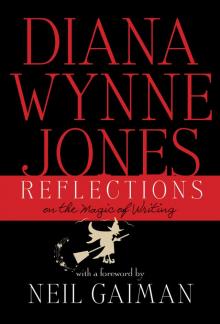 Reflections: On the Magic of Writing
Reflections: On the Magic of Writing The Game
The Game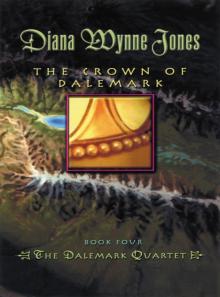 The Crown of Dalemark
The Crown of Dalemark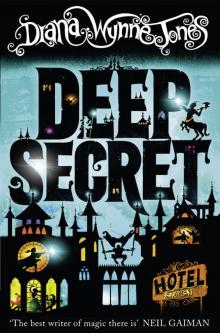 Deep Secret
Deep Secret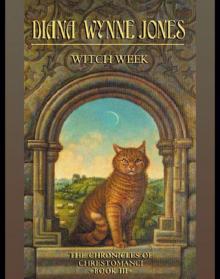 Witch Week
Witch Week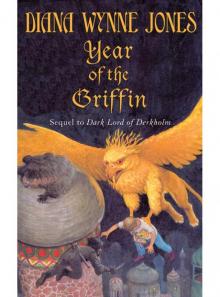 Year of the Griffin
Year of the Griffin Wild Robert
Wild Robert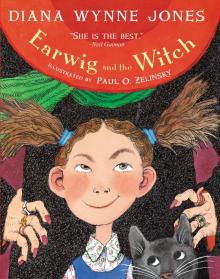 Earwig and the Witch
Earwig and the Witch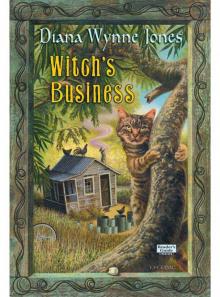 Witch's Business
Witch's Business Dogsbody
Dogsbody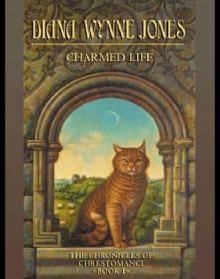 Caribbean Cruising
Caribbean Cruising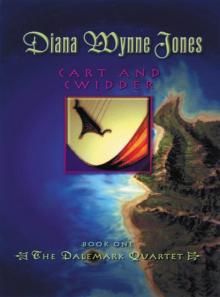 Cart and Cwidder
Cart and Cwidder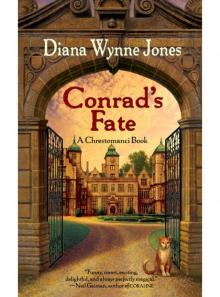 Conrad's Fate
Conrad's Fate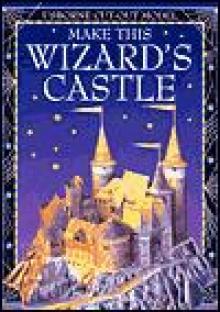 Howl's Moving Castle
Howl's Moving Castle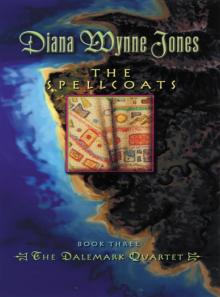 The Spellcoats
The Spellcoats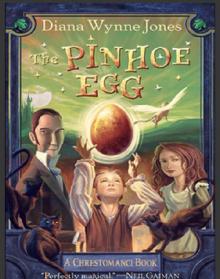 The Pinhoe Egg
The Pinhoe Egg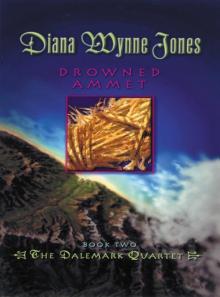 Drowned Ammet
Drowned Ammet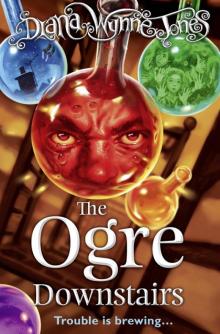 The Ogre Downstairs
The Ogre Downstairs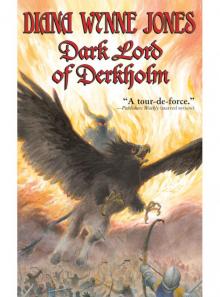 Dark Lord of Derkholm
Dark Lord of Derkholm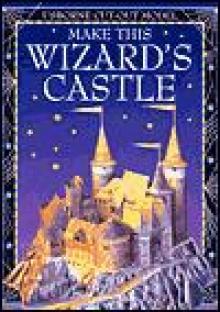 Castle in the Air
Castle in the Air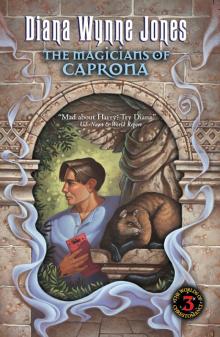 The Magicians of Caprona
The Magicians of Caprona A Tale of Time City
A Tale of Time City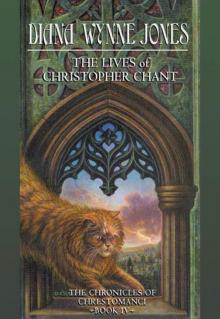 The Lives of Christopher Chant
The Lives of Christopher Chant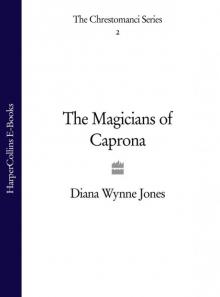 The Magicians of Caprona (UK)
The Magicians of Caprona (UK)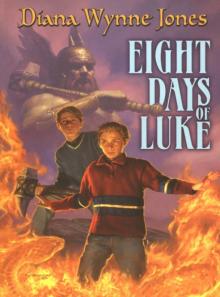 Eight Days of Luke
Eight Days of Luke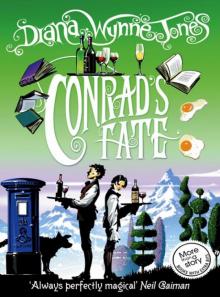 Conrad's Fate (UK)
Conrad's Fate (UK)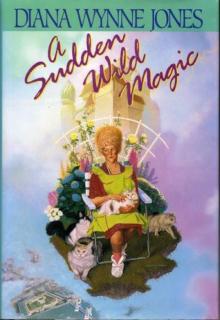 A Sudden Wild Magic
A Sudden Wild Magic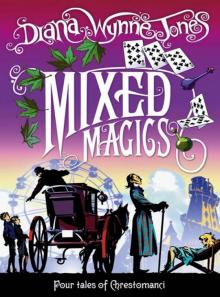 Mixed Magics (UK)
Mixed Magics (UK)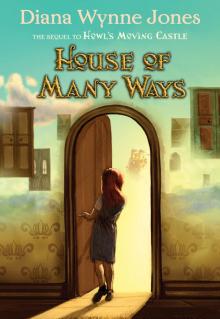 House of Many Ways
House of Many Ways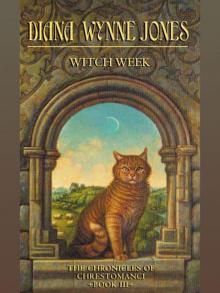 Witch Week (UK)
Witch Week (UK)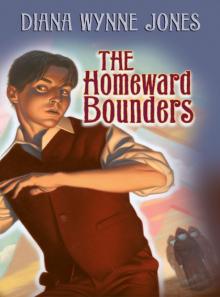 The Homeward Bounders
The Homeward Bounders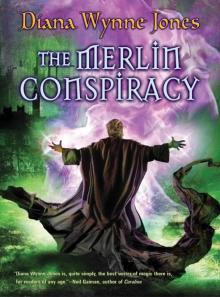 The Merlin Conspiracy
The Merlin Conspiracy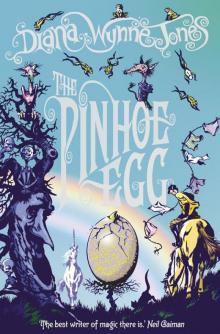 The Pinhoe Egg (UK)
The Pinhoe Egg (UK)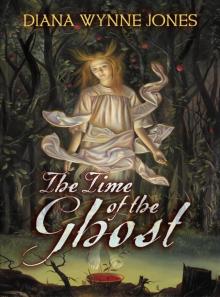 The Time of the Ghost
The Time of the Ghost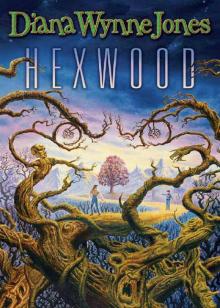 Hexwood
Hexwood Enchanted Glass
Enchanted Glass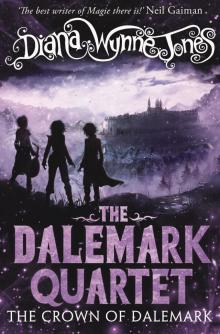 The Crown of Dalemark (UK)
The Crown of Dalemark (UK)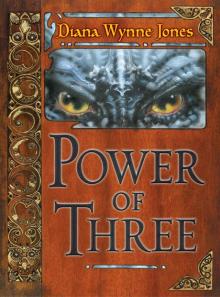 Power of Three
Power of Three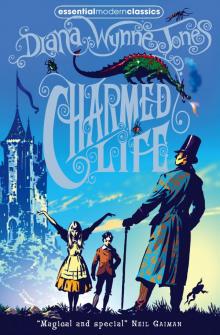 Charmed Life (UK)
Charmed Life (UK)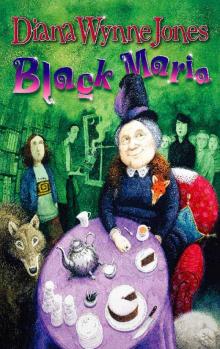 Black Maria
Black Maria The Islands of Chaldea
The Islands of Chaldea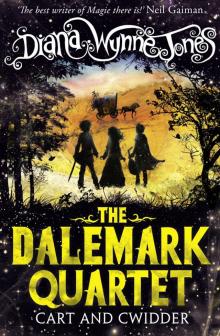 Cart and Cwidder (UK)
Cart and Cwidder (UK)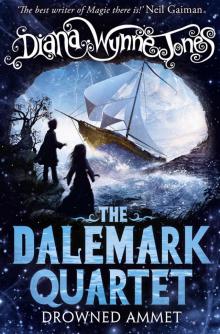 Drowned Ammet (UK)
Drowned Ammet (UK)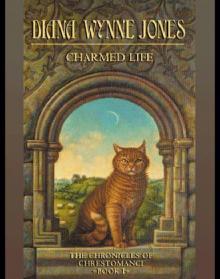 Charmed Life
Charmed Life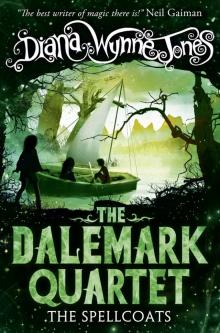 The Spellcoats (UK)
The Spellcoats (UK)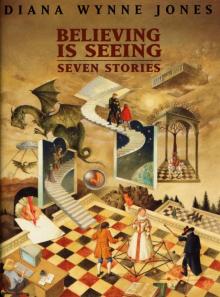 Believing Is Seeing
Believing Is Seeing Samantha's Diary
Samantha's Diary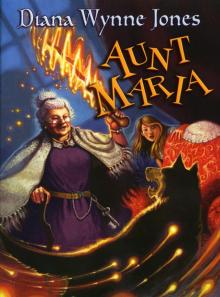 Aunt Maria
Aunt Maria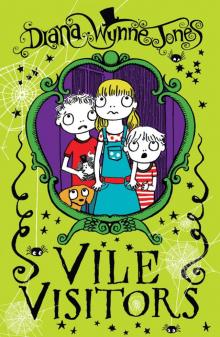 Vile Visitors
Vile Visitors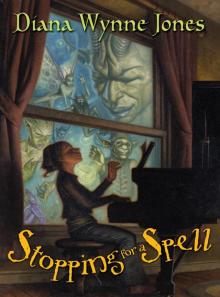 Stopping for a Spell
Stopping for a Spell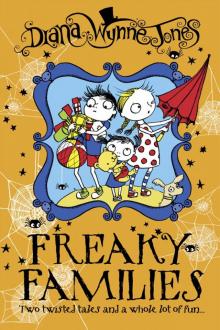 Freaky Families
Freaky Families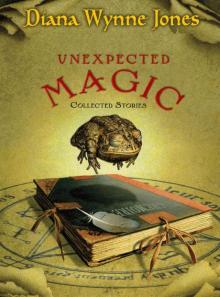 Unexpected Magic
Unexpected Magic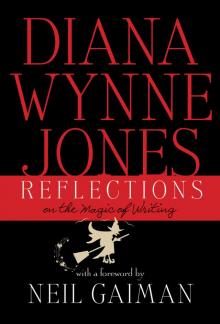 Reflections
Reflections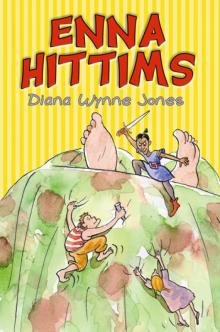 Enna Hittms
Enna Hittms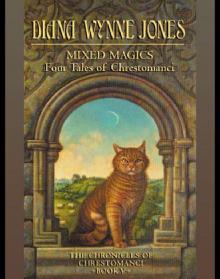 Mixed Magics: Four Tales of Chrestomanci
Mixed Magics: Four Tales of Chrestomanci